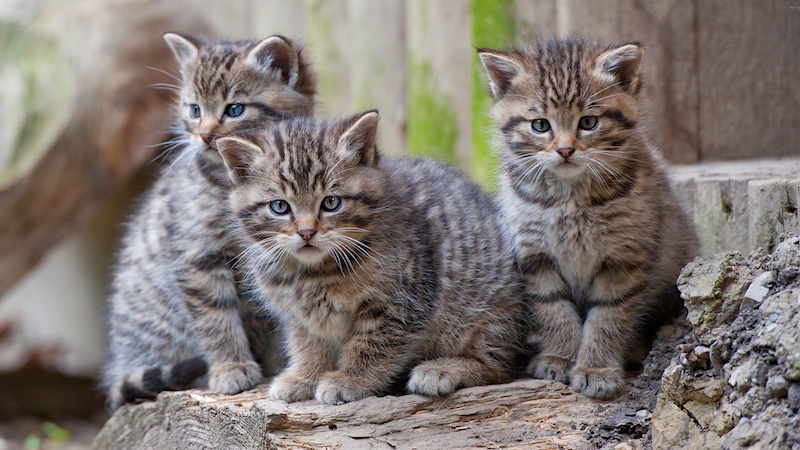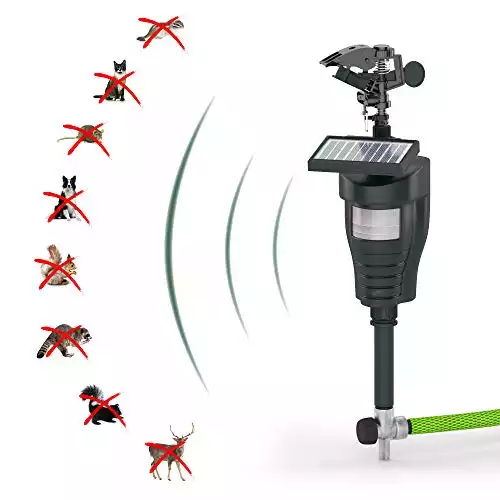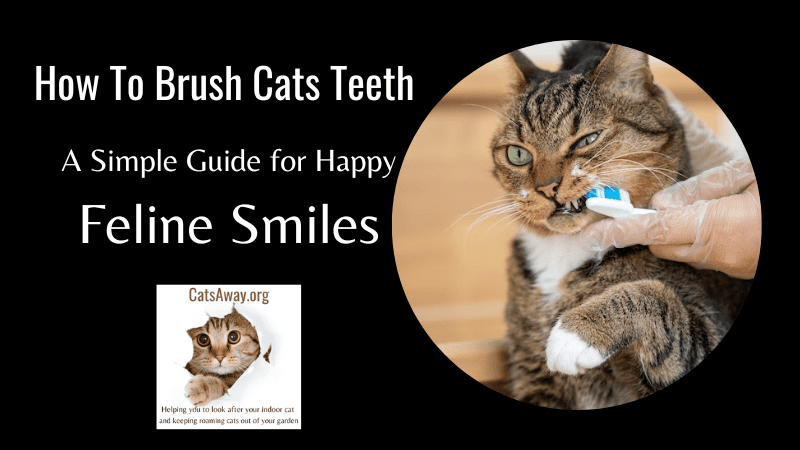Fed up with the local cat population crapping in your flower beds? Do you want to discover how to keep cats out of your yard? You’re not alone and whilst it can be a difficult task, often it is possible.
By identifying access points and using deterrents such as water sprayers, noise repellents or physical barriers like netting and chicken wire – combined with natural solutions like plants and herbs that cats hate – you’ll have an effective strategy for keeping them out.
In this article I discuss all the successful methods I have used to keep cats out of my yard so that you too can enjoy a cat-free space.
Identifying Access Points
Inspecting Your Yard:
The first step in figuring out how to keep cats out of your yard is to inspect the perimeter and try to figure out how the critters are getting in. Look around the boundary of your property and check for any gaps or holes that a cat could fit through.
Pay special attention to areas near fences, sheds, garages, decks, and other structures where cats may be able to find shelter or hide from predators. Also look at overhanging trees and shrubs that may provide access into your yard.
Common Entry Points:
Cats can squeeze through surprisingly small spaces so even if you don’t see an obvious gap in the fence they might still be able to get in. Common entry points include gaps under gates, broken boards on fences and openings between slats on chain link fencing. If there are any nearby trees with low-hanging branches these can also provide easy access for cats looking for a way into your garden.
Once you have identified all possible entry points, it is time to start securing them against intruders. Start by repairing any broken boards or replacing missing sections of fence with new materials such as chicken wire or burlap sacks filled with rocks or sandbags, which will make it difficult for cats (or other animals) to climb over them.
Make sure gates close securely and consider installing additional latches if necessary.
Cat Deterrents
If you can’t make your fence cat proof the next step is to make your yard as unattractive to your neighborhood cats as possible so that they don’t bother coming back.
Water Sprayers:
Cats hate water so a motion activated sprinkler is one of the most effective ways to keep cats away from your yard. They work by spraying a jet of water when the cat enters within range, startling them and making them run. It works on feral cats, stray cats and pet cats, racoons, deer, dogs, squirrels and just about any other critter you can think of.
- Motion sensor activated
- No more mains cable or batteries to worry about
- Extremely robust and well made
- Range of spray is fully adjustable
- The noise and movement already has the cat running before the water actually sprays
- Covers up to 1000 sq. ft.
- 1 year warranty
- Cats absolutely hate the Hoont Cobra
- Also works on dogs, foxes, rabbits, heron etc.
- May be overkill for very small gardens
Noise Repellents:
Noise cat repellents are another great option for keeping stray cats out of your yard. These devices emit high-frequency sounds that only animals can hear, making it unpleasant for cats to be around but not disturbing humans nearby. There are several different types available on the market including the ones I’ve personally tested and can vouch for below.
Visual Deterrents:
Visual deterrents use bright lights or reflective surfaces to scare off cats from entering an area they shouldn’t be in. Examples include motion-activated spotlights or laser pointers which create flashes of light when triggered by movement; these will startle any animal who comes too close and make them want to stay away from that area in the future.
Other visual cat deterrents include hanging shiny objects like CDs or aluminum foil strips in and around your flower beds; these will reflect sunlight and create moving shadows, which can frighten curious cats away.
Deterrents can be effective in deterring cats out of your garden, but physical barriers are often the most reliable solution. In the next section, we’ll explore some physical barrier options for protecting your garden from neighbourhood cats.
Physical Barriers
Before you start looking at buying one of the many commercial cat repellents on the market you should first of all consider if there’s anything you can do to discourage or stop cats from entering your yard in the first place.
Netting and Fencing:
Netting and fencing are two of the most effective physical barriers for keeping all cats out of your garden. Netting can be placed over flower beds or other areas where cats may try to enter, while fencing can be used to create a perimeter around the entire yard.
When using netting, make sure it is securely fastened so that cats cannot climb over or squeeze through any gaps. For fences, choose a height that will deter cats from jumping over them. Both netting and fencing should also have an angled top to prevent cats from attempting to scale them.
Chicken wire is another popular option for keeping neighborhood cats out of gardens as they don’t like the feel of it on their paws. Install chicken wire directly onto existing fences or used on its own with stakes driven into the ground at regular intervals along the perimeter of your garden.
Burlap sacks filled with soil can also be used in combination with it, providing extra weight to help keep the fence in place even if a cat tries to push against it and protecting plants from being damaged by sharp edges on the mesh when installed correctly.
Physical barriers such as netting, fencing and burlap sacks are an effective way to keep cats out of your yard. However, there are also natural solutions that can be used to repel cats from your garden without the need for physical structures.
Natural Solutions
If you have any catnip planted in your garden you should get rid of it as it’s a magnet to many cats who get high on the scent.
Plants and Herbs Cats Hate:

There are plenty of plants that keep cats away. Some of the most effective natural cat repellents include the Scaredy Cat plant, lavender, rue, pennyroyal, rosemary, and citronella grass.
These plants have strong scents that cats find unpleasant. If you don’t want to plant these herbs directly into your garden soil, you can also try planting them in containers or hanging baskets around the perimeter of your yard.
Home remedies to keep cats out of your yard
Essential oils are another natural way to repel cats from your garden. The most popular for this purpose are lemon balm oil, peppermint oil, eucalyptus oil, tea tree oil and lemongrass oil.
You can mix a few drops of each with water in a spray bottle and use it on any areas where cats may be entering or lingering in your yard. Be sure not to spray it directly onto any plants as some essential oils can damage foliage if used too heavily or too often; exercise caution when using these products.
If these don’t work try some of our readers home made cat repellent recipes that you can easily make yourself. A cats sense of smell changes with age so what works on one may not on another so it’s always a good idea to try more that one homemade cat repellent.
Using natural solutions such as plants, herbs, and essential oils can be a great way to keep cats out of your yard. However, if cats have already visited the area, it is important to properly clean up after them in order to discourage further visits.
Cleaning Up If Cats Get in Your Yard
Removing Cat Waste Safely and Properly:

Cat poop can be dangerous so it is important to remove it from your yard as soon as possible in order to maintain hygiene and prevent the spread of disease. When removing cat waste, it is best to wear gloves and use a shovel or scoop to pick up the waste.
Place the waste into a plastic bag that can be securely tied shut before disposing of it properly. If you have access to a hose, spraying down the area with water can help reduce odors and discourage further visits from neighbourhood cats.
Cayenne pepper, coffee grounds or vinegar are all odors cats dislike so sprinkling around the area will also deter them from using the same spot again.
FAQs in Relation to How to Keep Cats Out of Your Yard
How to get rid of neighbors cats in my yard?

There are several methods to keep neighbourhood cats out of your garden. Firstly, you can install a physical barrier such as fencing or netting around the perimeter of your yard.
Secondly, consider investing in an ultrasonic cat repellent device which emits high frequency sound waves that cats find unpleasant and will avoid. With these methods combined, it should be possible to keep neighbourhood cats away from your garden.
Thirdly, you can place scent deterrents such as citrus peels or cayenne pepper around the perimeter of your yard to prevent cats from entering.
Finally, if all else fails invest in a motion-activated sprinkler that will spray water when triggered by movement.
Why do stray cats come into my yard?

Cats will be attracted to yards that have lots of bird activity so if you have a bird table or bird bath in your garden you should consider putting it away in the shed, at least until you have solved your cat problem.
Check you don’t have plants growing that attracts cats to your yard. Catnip in particular will have all the local cats heading to your yard.
Finally, you can make sure to remove any potential food sources like pet food dishes which may attract cats into your garden space.
Bird tables, feeders and baths may attract birds to your garden but where there are birds cats will follow.
Additionally, if possible try to provide an alternate outdoor area for cats in your neighbourhood with things like scratching posts and toys so they have somewhere else to go instead of your garden.
What smells will keep cats away?

There are a variety of smells that cats find unpleasant and will avoid. Commonly used scents to keep cats away include citrus, lavender, peppermint, and eucalyptus. Citrus fruit peels such as oranges or lemons can be placed around the garden perimeter to repel cats.
Lavender oil can also be applied directly onto furniture or the ground in the garden area. Peppermint oil is another effective scent for keeping cats away; it can be diluted with water and sprayed around the perimeter of your yard. Finally, eucalyptus leaves have been known to deter cats from entering certain areas when scattered around them.
What is the most effective homemade cat repellent?

Homemade cat repellents can be effective in keeping cats away from your garden. The most popular and effective homemade cat repellent is a mixture of equal parts white vinegar, water, and lemon or orange essential oil. Spraying this solution around the perimeter of your garden will create an unpleasant scent that cats find unappealing.
Additionally, sprinkling cayenne pepper flakes around the area may also help to deter cats from entering your yard. Finally, making sure to clean up any messes quickly and properly disposing of food waste can also help keep cats away as they won’t have anything to attract them into your space.
Conclusion
Overall, keeping cats out of your yard is a difficult task but with the right strategies and solutions, it can be done. If not, then with the use of either a few natural or a commercial cat deterrent you can put them off from returning.
Are you tired of neighborhood cats wreaking havoc in your garden and invading your outdoor space? It’s time to take action! There are a variety of humane solutions available that will help keep cats out of your yard while also caring for them.
With the right tools and strategies you can protect both yourself and the cats from potential harm.






